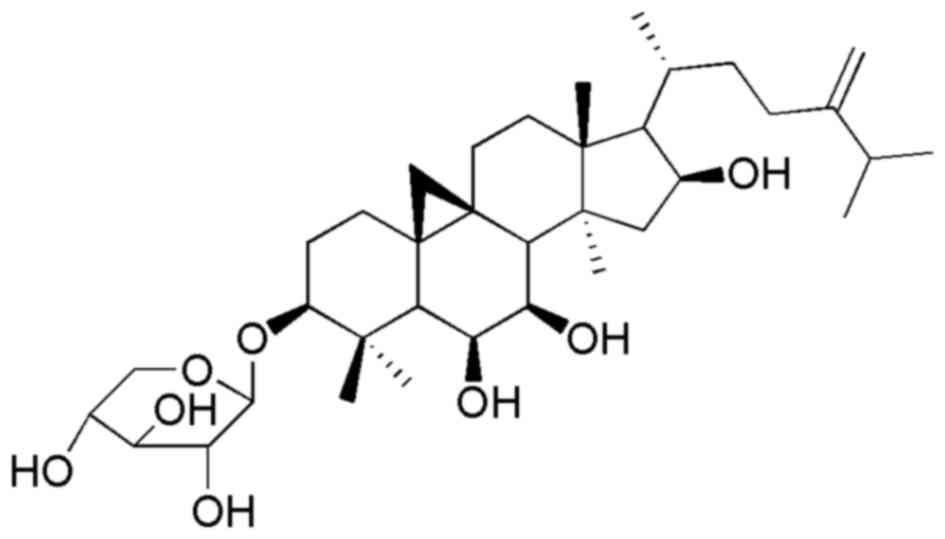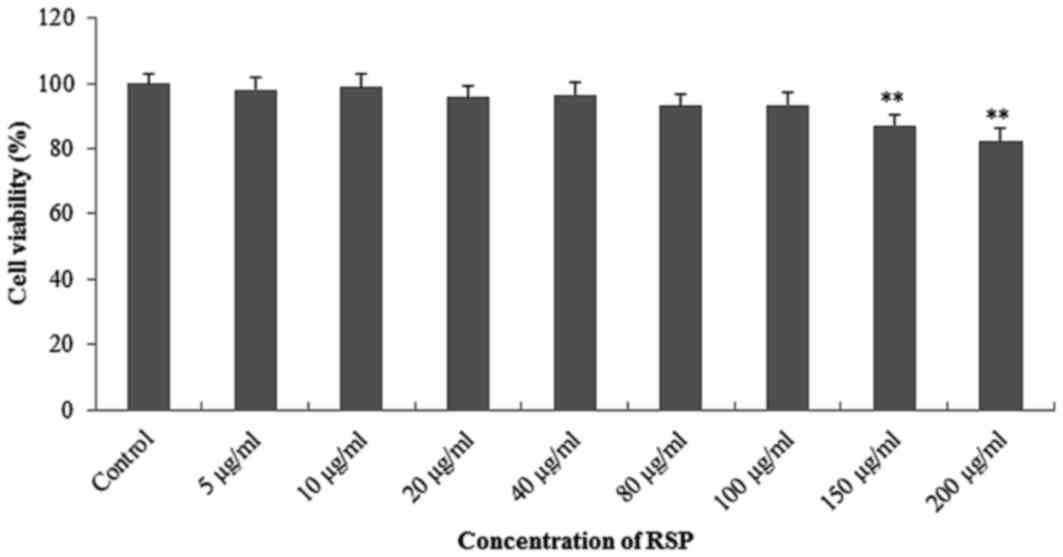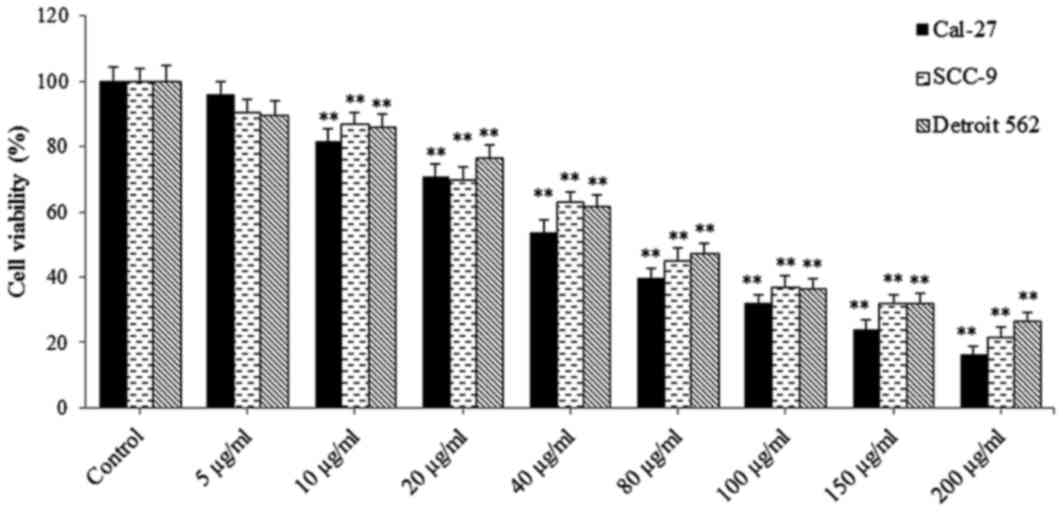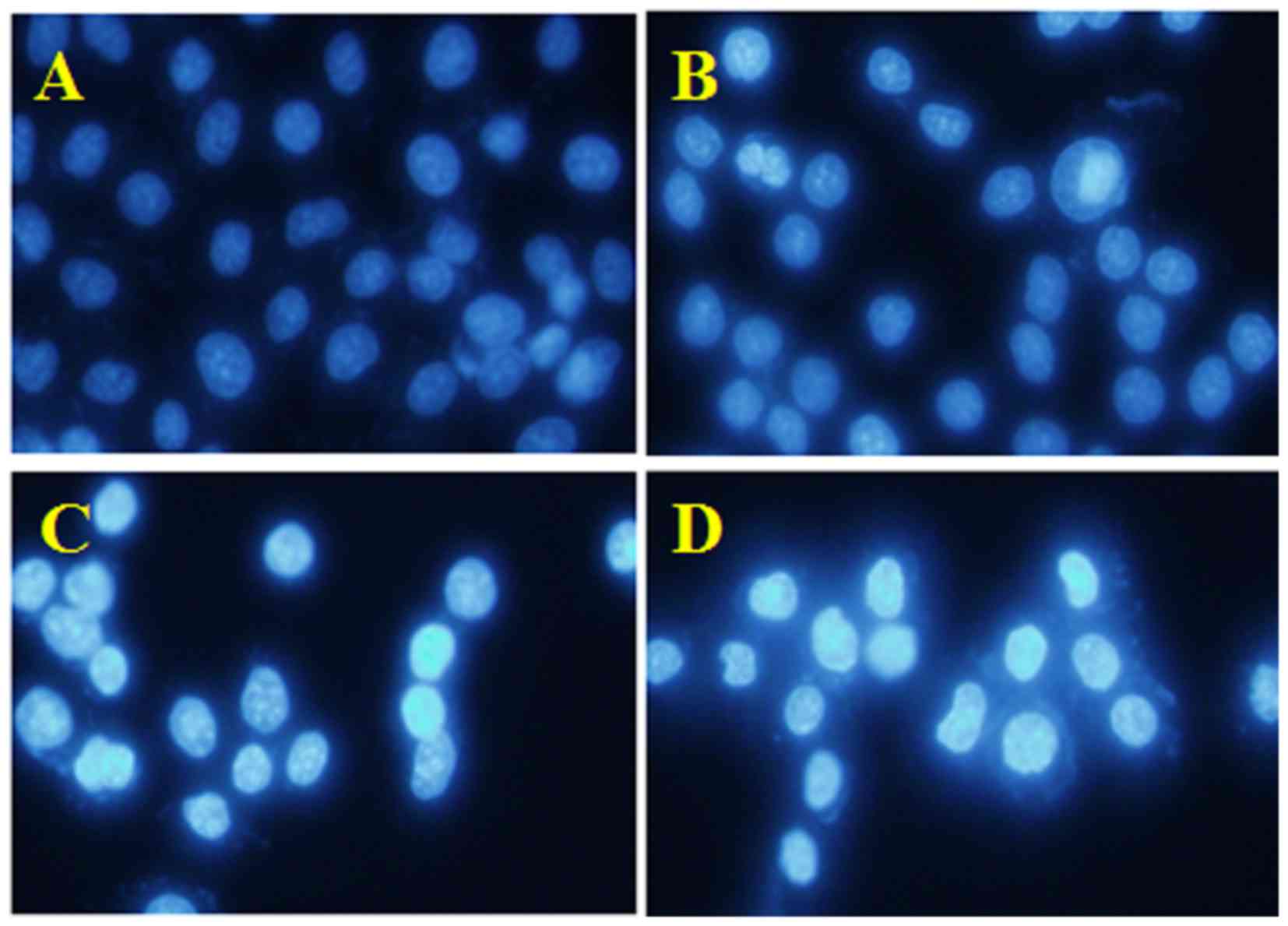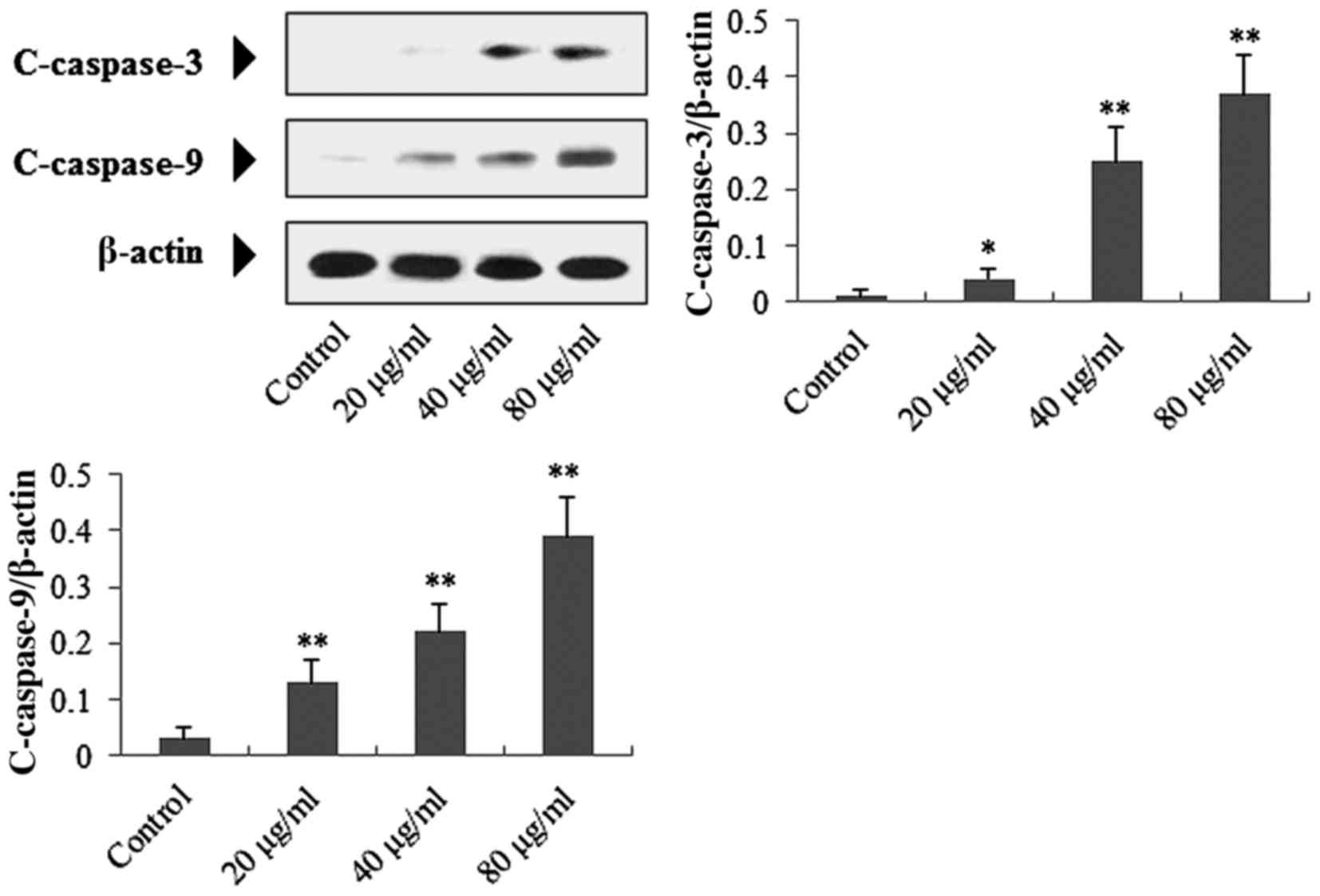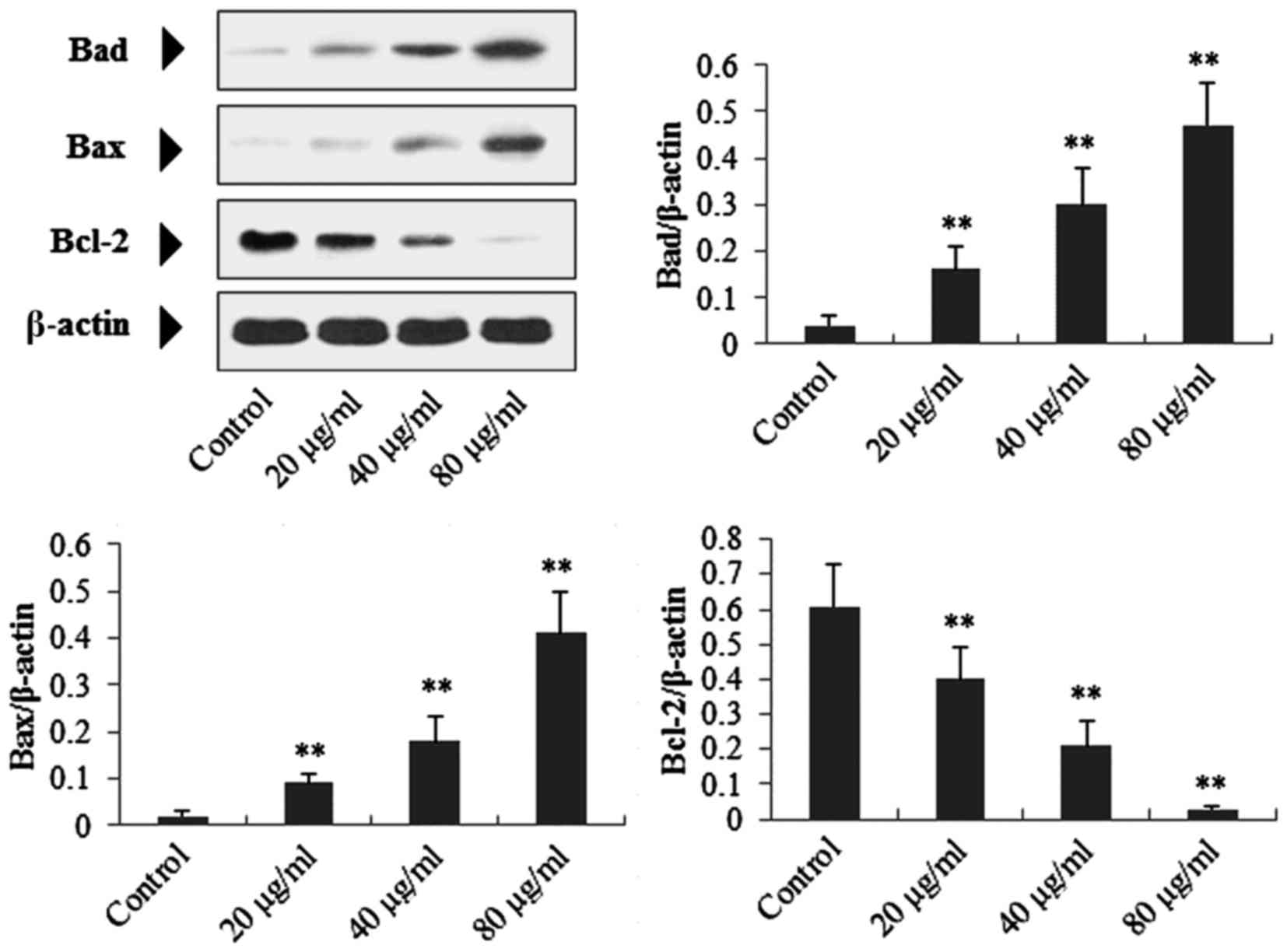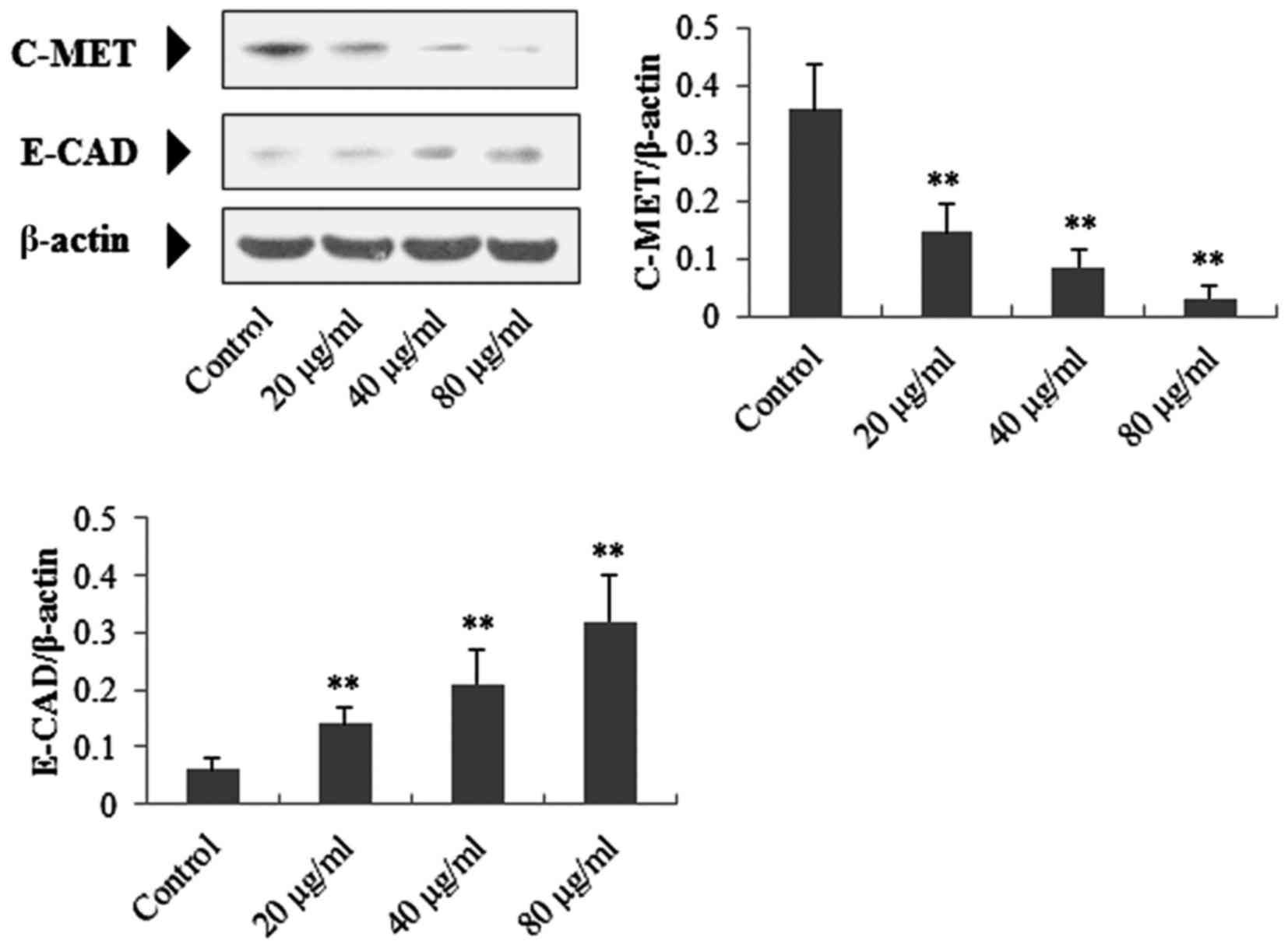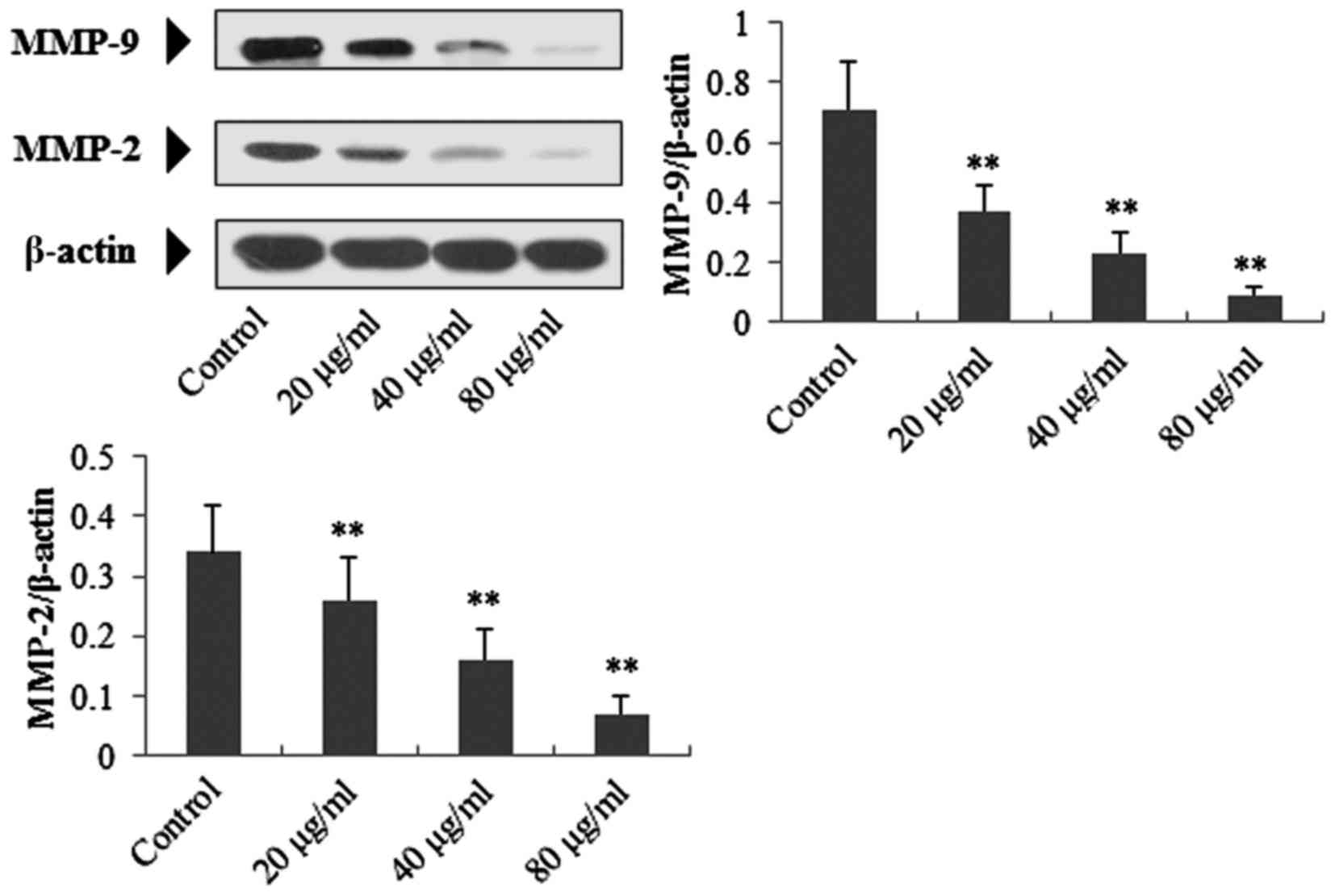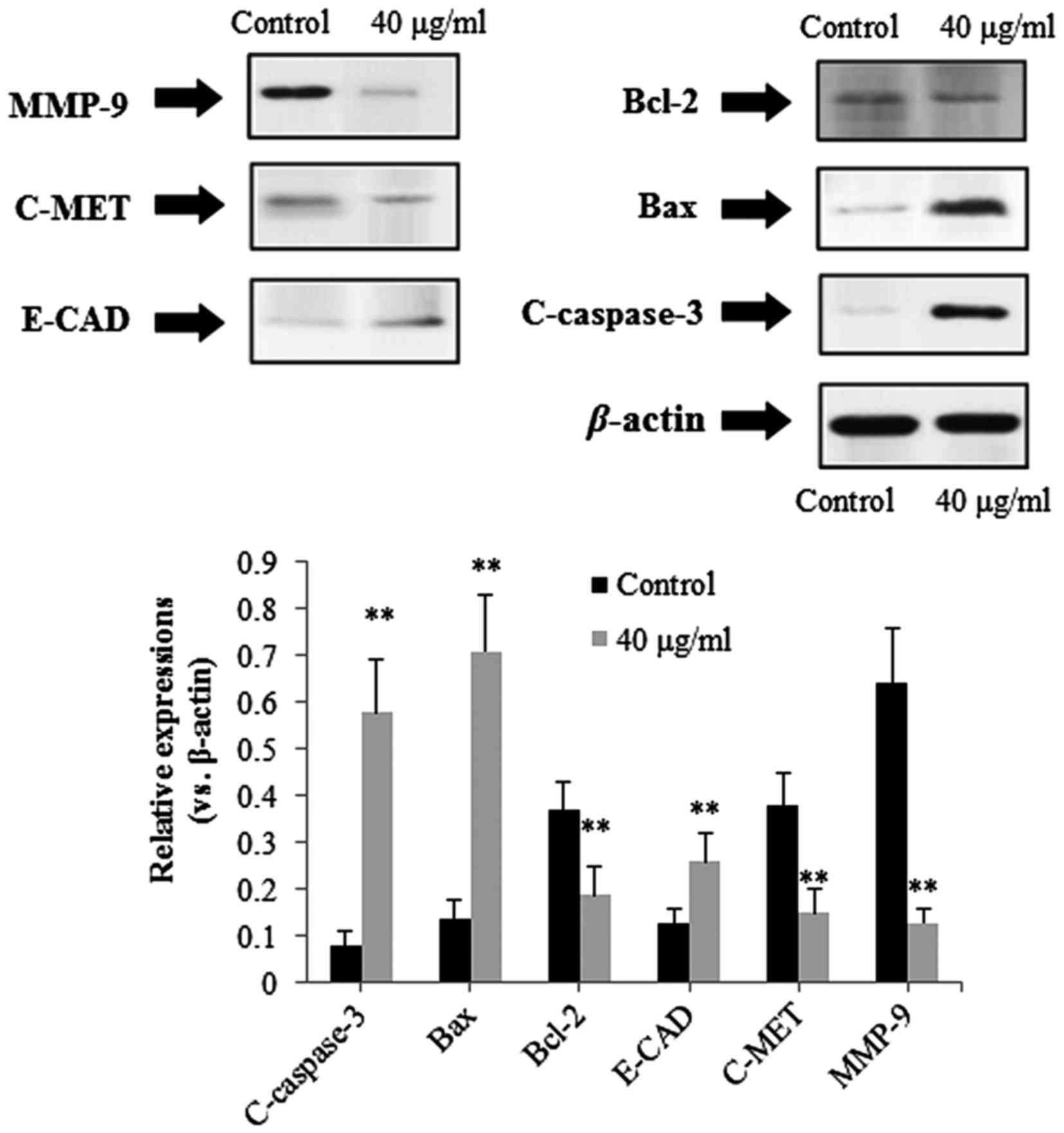|
1
|
Huang HZ and Wang C: Molecular mechanisms
of invasion-metastasis cascade in oral cancer. J Oral Maxil Surg.
20:77–82. 2011.
|
|
2
|
Kaomongkolgit R, Cheepsunthorn P, Pavasant
P and Sanchavanakit N: Iron increases MMP-9 expression through
activation of AP-1 via ERK/Akt pathway in human head and neck
squamous carcinoma cells. Oral Oncol. 44:587–594. 2008. View Article : Google Scholar : PubMed/NCBI
|
|
3
|
Siegel R, Naishadham D and Jemal A: Cancer
statistics, 2012. CA Cancer J Clin. 62:10–29. 2012. View Article : Google Scholar : PubMed/NCBI
|
|
4
|
Malik UU, Zarina S and Pennington SR: Oral
squamous cell carcinoma: Key clinical questions, biomarker
discovery, and the role of proteomics. Arch Oral Biol. 63:53–65.
2016. View Article : Google Scholar : PubMed/NCBI
|
|
5
|
Acharya S, Rai P, Hallikeri K, Anehosur V
and Kale J: Serum lipid profile in oral squamous cell carcinoma:
Alterations and association with some clinicopathological
parameters and tobacco use. Int J Oral Maxillofac Surg. 45:713–720.
2016. View Article : Google Scholar : PubMed/NCBI
|
|
6
|
Abe S, Oikawa M, Miki Y, Shimizu Y, Suzuki
T, Takahashi T and Kumamoto H: Immunohistochemical and genetic
evaluations of epidermal growth factor receptor (EGFR) in oral
squamous cell carcinoma. J Oral Maxillofac Surg Med Pathol.
28:174–181. 2016. View Article : Google Scholar
|
|
7
|
Gohulkumar M, Gurushankar K, Prasad N
Rajendra and Krishnakumar N: Enhanced cytotoxicity and
apoptosis-induced anticancer effect of silibinin-loaded
nanoparticles in oral carcinoma (KB) cells. Mater Sci Eng C Mater
Biol Appl. 41:274–282. 2014. View Article : Google Scholar : PubMed/NCBI
|
|
8
|
Chen L, Zeng R and Zhuang Y: In vitro
anti-gastric tumor activities and possible mechanisms of action of
paederosidic acid from Paederia scandens (Lour) Merrill. Trop J
Pharm Res. 14:795–800. 2015. View Article : Google Scholar
|
|
9
|
Kinghorn AD, Chin YW and Swanson SM:
Discovery of natural product anticancer agents from biodiverse
organisms. Curr Opin Drug Discov Devel. 12:189–196. 2009.PubMed/NCBI
|
|
10
|
Peng W, Hu C, Shu Z, Han T, Qin L and
Zheng C: Antitumor activity of tatariside F isolated from roots of
Fagopyrum tataricum (L.) Gaertn against H22 hepatocellular
carcinoma via up-regulation of p53. Phytomedicine. 22:730–736.
2015. View Article : Google Scholar : PubMed/NCBI
|
|
11
|
Liu P, Yang H, Long F, Hao HP, Xu X, Liu
Y, Shi XW, Zhang DD, Zheng HC, Wen QY, et al: Bioactive equivalence
of combinatorial components identified in screening of an herbal
medicine. Pharm Res. 31:1788–1800. 2014. View Article : Google Scholar : PubMed/NCBI
|
|
12
|
Wu WY, Hou JJ, Long HL, Yang WZ, Liang J
and Guo DA: TCM-based new drug discovery and development in China.
Chin J Nat Med. 12:241–250. 2014.PubMed/NCBI
|
|
13
|
Lee I, Kim J, Kim YS, Yoo NH, Kim CS, Jo
K, Kim JH, Bach TT and Kim JS: Cycloartane-type triterpenes from
the leaves of Homonoia Riparia with VEGF-induced angiogenesis
inhibitor activity. J Nat Prod. 75:1312–1318. 2012. View Article : Google Scholar : PubMed/NCBI
|
|
14
|
State Administration of Traditional
Chinese Medicine. Chinese Material Medica; Science and Technology
Press of Shanghai: Shanghai, China. 6:824–825. 1999.
|
|
15
|
Viswanadh GS, Ramaiah PA, Laatsch H and
Maskey R: Chemical constituents of the heartwood and bark of
Homonoia riparia. J Trop Med Plants. 7:267–273. 2006.
|
|
16
|
Xu F, Zhao X, Yang L, Wang X and Zhao J: A
new cycloartane-type triterpenoid saponin xanthine oxidase
inhibitor from Homonoia riparia Lour. Molecules. 19:13422–13431.
2014. View Article : Google Scholar
|
|
17
|
Qi F, Li A, Zhao L, Xu H, Inagaki Y, Wang
D, Cui X, Gao B, Kokudo N, Nakata M and Tang W: Cinobufacini, an
aqueous extract from Bufo bufo gargarizans Cantor, induces
apoptosis through a mitochondria-mediated pathway in human
hepatocellular carcinoma cells. J Ethnopharmacol. 128:654–661.
2010. View Article : Google Scholar
|
|
18
|
Kerr JF, Winterford CM and Harnon BV:
Apoptosis. Its significance in cancer and cancer therapy. Cancer.
73:2013–2026. 1994. View Article : Google Scholar
|
|
19
|
Wang X: The expanding role of mitochondria
in apoptosis. Genes Dev. 15:2922–2933. 2001.
|
|
20
|
Galluzzi L, Zamzami N, de La Motte Rouge
T, Lemaire C, Brenner C and Kroemer G: Methods for the assessment
of mitochondrial membrane permeabilization in apoptosis. Apoptosis.
12:803–813. 2007. View Article : Google Scholar
|
|
21
|
Shi YG: A structural view of
mitochondria-mediated apoptosis. Nat Struct Biol. 8:394–401. 2011.
View Article : Google Scholar
|
|
22
|
Chipuk JE, McStay GP, Bharti A, Kuwana T,
Clarke CJ, Siskind LJ, Obeid LM and Green DR: Sphingolipid
metabolism cooperates with BAK and BAX to promote the mitochondrial
pathway of apoptosis. Cell. 148:988–1000. 2012. View Article : Google Scholar
|
|
23
|
Beavon IR: The E-cadherin-catenin complex
in tumour metastasis: Structure, function and regulation. Eur J
Cancer. 36:1607–1620. 2000. View Article : Google Scholar
|
|
24
|
Martínez A, Spencer ML, Borlando J, Flores
M and Rojas IG: E-cadherin and c-Met expression in actinic cheilits
and lip squamous cell carcinoma. Rev Clin Periodoncia Implantol
Rehabil Oral. 4:122–125. 2011. View Article : Google Scholar
|
|
25
|
Yang XK, Yang YD, Tang SQ, Xu L, Yang GH,
Xu QY, Tang H and Wu JJ: Inhibitory effect of polysaccharides from
Scutellaria barbata D. Don on invasion and metastasis of 95-D cells
lines via regulation of C-MET and E-CAD expressions. Trop J Pharm
Res. 12:517–522. 2013.
|
|
26
|
Yang L, Liu M, Deng C, Gu Z and Gao Y:
Expression of transforming growth factor-β1 (TGF-β1) and E-cadherin
in glioma. Tumour Biol. 33:1477–1484. 2012. View Article : Google Scholar
|
|
27
|
Qin Y, Ye GX, Wu CJ, Wang S, Pan DB, Jiang
JY, Fu J and Xu SQ: Effect of DAPK1 gene on proliferation,
migration, and invasion of carcinoma of pancreas BxPC-3 cell line.
Int J Clin Exp Pathol. 7:7536–7544. 2014.
|
|
28
|
Sanchavanakit N, Saengtong W,
Manokawinchoke J and Pavasant P: TNF-α stimulates MMP-3 production
via PGE2 signalling through the NF-κB and p38 MAPK pathway in a
murine cementoblast cell line. Arch Oral Biol. 60:1066–1074. 2015.
View Article : Google Scholar
|
|
29
|
Duxbury MS and Whang EE: RRM2 induces
NF-kappaB-dependent MMP-9 activation and enhances cellular
invasiveness. Biochem Biophys Res Commun. 354:190–196. 2007.
View Article : Google Scholar
|
|
30
|
Silva EJ, Argyris PP, Zou XQ, Ross KF and
Herzberg MC: S100A8/A9 regulates MMP-2 expression and invasion and
migration by carcinoma cells. Int J Biochem Cell Biol. 55:279–287.
2014. View Article : Google Scholar
|















